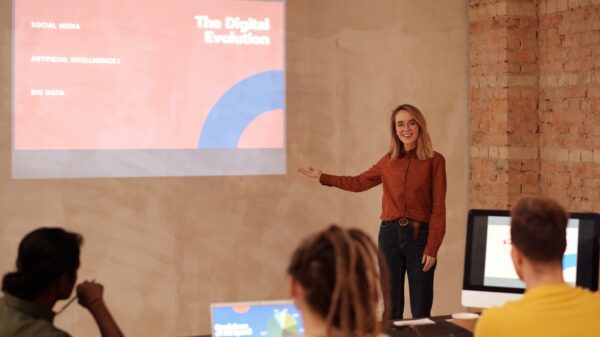“Education is not just a phase of life that ends after graduation; it’s a lifelong journey that never truly stops. The power of learning can be harnessed at any age, opening up new doors and expanding our horizons in ways we never thought possible. In today’s fast-paced world where knowledge is king, embracing education as an ongoing process is the key to unlocking your full potential. Join us as we explore the benefits of lifelong learning and how it can transform your personal and professional growth for years to come.”
Introduction: The Value of Lifelong Learning
In a rapidly changing world, it’s more important than ever to embrace lifelong learning. Whether you’re looking to improve your career prospects, keep up with the latest industry trends, or simply learn something new, there are many benefits to continuing your education throughout your life.
Here are just a few of the reasons why lifelong learning is so important:
1. It helps you stay competitive in the workforce.
In today’s economy, it’s essential to keep your skills up-to-date. Lifelong learning can help you stay ahead of the curve and make yourself more attractive to employers.
2. It keeps your mind sharp.
Lifelong learning helps keep your brain active and engaged, which can help ward off cognitive decline as you age. Learning new things also has a positive impact on mental health and can help reduce stress levels.
3. It can make you happier and healthier.
Studies have shown that people who engage in lifelong learning are generally happier and healthier than those who don’t. They also tend to live longer lives!
4. It gives you a sense of accomplishment.
There’s nothing quite like the feeling of accomplishment that comes from completing a course or learning something new. When you set goals and achieve them, it boosts your confidence and self-esteem.
Benefits of Lifelong Learning
Lifelong learning has many benefits, both personal and professional.
On a personal level, lifelong learning can help you stay sharp as you age. It can also give you a sense of purpose and satisfaction, and can help combat depression and isolation. In addition, lifelong learning can keep your mind active and help delay the onset of dementia.
On a professional level, lifelong learning can help you stay ahead of the curve in your field. It can also make you more marketable to employers and open up new career opportunities. In addition, lifelong learning can help you earn more money over the course of your career.
Strategies for Adopting Lifelong Learning
Lifelong learning is a mindset that values continual growth and development throughout one’s life. It can be difficult to adopt this way of thinking, especially if you’ve been out of the formal education system for awhile. But there are many benefits to lifelong learning, both personally and professionally. Here are some strategies for adopting a lifelong learning mindset:
1. Make time for learning. Dedicate some time each week, even if it’s just an hour or two, to reading, taking courses, or pursuing other interests.
2. Set goals. What do you want to learn? What skills would you like to develop? Setting specific goals will help you stay motivated and on track.
3. Be open to new ideas. Be willing to try new things and explore different viewpoints. This will help you expand your horizons and grow as a person.
4. Be patient with yourself. Learning takes time, so don’t expect miracles overnight! Rome wasn’t built in a day, and neither is a successful lifelong learner. Just keep at it and enjoy the journey!
How to Find and Take Advantage of Educational Opportunities
The world of education is always changing, and it can be hard to keep up with the latest opportunities. But lifelong learning is important, no matter your age. Here are a few tips on how to find and take advantage of educational opportunities:
1. Use the internet to your advantage. The internet is a great resource for finding educational opportunities. There are many websites that list upcoming events, conferences, and courses. You can also use social media to connect with others who share your interests and might be able to point you in the right direction.
2. Don’t be afraid to ask for help. If you’re not sure where to start, ask family and friends for suggestions. You can also talk to your local library staff or search online for forums and chat groups dedicated to lifelong learning.
3. Know your learning style. Some people learn best by attending lectures or taking classes, while others prefer more hands-on learning experiences. There’s no wrong way to learn, so figure out what works best for you and seek out opportunities that fit your style.
4. Take advantage of free resources. Many museums, libraries, and community organizations offer free educational programs and resources. These can be great ways to learn new things without spending any money.
5. Be open to new experiences. Learning doesn’t always have to happen in a formal setting like a classroom—it can happen anywhere, at any time. Keep your mind open to new possibilities and you’ll
Examples of Beneficiaries of Lifelong Education
There are many examples of beneficiaries of lifelong education. People who have embraced education at any age have often found success in their chosen field, whether it be in their career or personal life.
Some well-known beneficiaries of lifelong learning include Bill Gates, co-founder of Microsoft; Oprah Winfrey, media mogul and talk show host; and Warren Buffett, billionaire investor and CEO of Berkshire Hathaway. These successful individuals all share a common trait: they never stopped learning.
Gates dropped out of college to start Microsoft, but he continued to learn about technology and business throughout his career. Winfrey was born into poverty but used her natural talents and charisma to build a massively successful media empire. And Buffett is known for his endless appetite for knowledge, reading 500 pages per day even at age 87!
These are just a few examples of how lifelong learning can lead to success. No matter your age or circumstances, it’s never too late to start learning new things and expanding your horizons. Who knows where it might take you!
Conclusion: Making Time for Learning
The lifelong learning process is something that can be started at any age and maintained throughout a person’s lifetime. It is never too late to start learning new things, whether it’s picking up a new hobby or taking courses to improve your career prospects.
One of the best things about learning new things is that it helps keep your mind active and sharp. As we age, it’s important to do everything we can to keep our minds healthy and engaged. Learning can help stave off cognitive decline and keep us feeling young at heart.
In addition to the mental benefits, lifelong learning can also have some great practical applications. For example, if you’re looking for a new job, updating your skillset with some new qualifications can make you a more competitive applicant.
Of course, making time for learning can be difficult, especially if you have a busy lifestyle. However, there are ways to fit it into your schedule – such as setting aside some time each day or week specifically for learning, or taking advantage of online resources that allow you to learn at your own pace.
Whatever route you take, incorporating lifelong learning into your life can be hugely rewarding. It’s never too late to start – so what are you waiting for?










